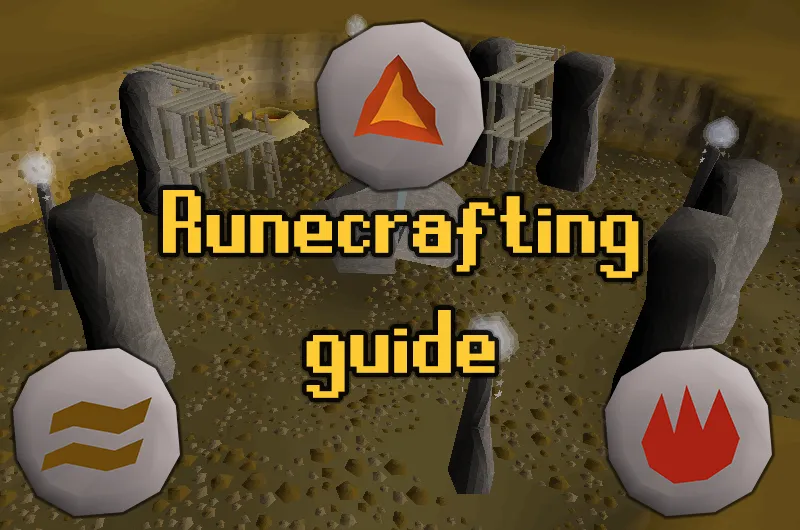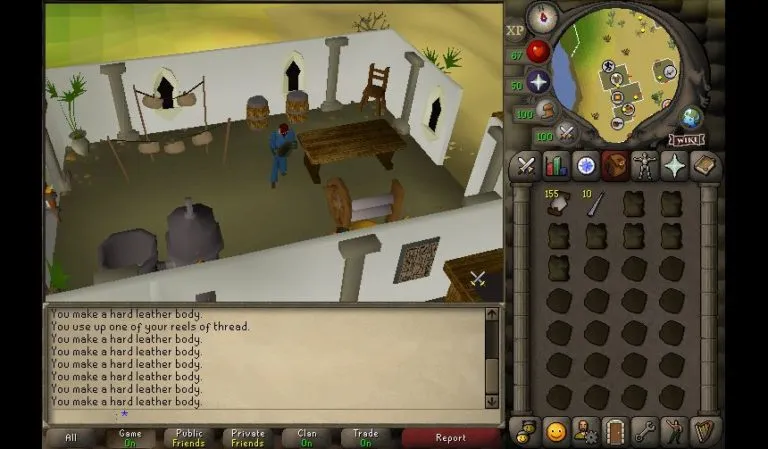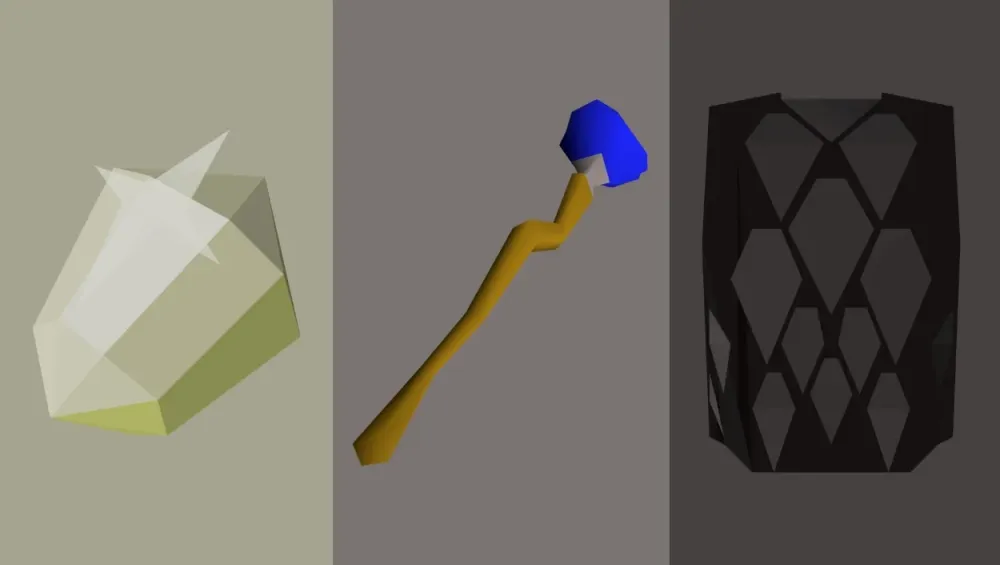Your cart is empty
Mastering Crafting Training in OSRS for Free-to-Play Players

Warning: Undefined variable $post in /home/osrsmoneymaking.guide/public_html/wp-content/themes/kadence/functions.php on line 391
Warning: Attempt to read property "ID" on null in /home/osrsmoneymaking.guide/public_html/wp-content/themes/kadence/functions.php on line 391
Crafting is a versatile skill in Old School RuneScape (OSRS) that allows players to create a wide array of items, from jewelry and armor to potions and decorative items. For free-to-play players, mastering this skill can significantly enhance gameplay by providing access to useful items and improving overall efficiency. Understanding the fundamentals of Crafting and its benefits will help players make the most of their in-game experience, even without a premium membership.
Crafting holds significant importance in OSRS for several reasons, especially for free-to-play players. Firstly, it provides access to various essential items that enhance gameplay. For instance, players can craft jewelry such as rings and amulets, which offer various bonuses that can improve combat abilities and other skills. Rings of recoil, for example, can deal damage back to attackers, while amulets can provide vital stat boosts.
Additionally, Crafting allows players to create armor pieces, such as the leather and studded leather armor sets, which offer better protection than the basic gear available in the free-to-play realm. This is crucial for players engaging in combat, as better armor increases survivability and allows for more efficient training.
Moreover, Crafting can be a profitable endeavor. Players can gather raw materials like hides and ores, craft them into items, and then sell these items on the Grand Exchange for a tidy profit. This economic aspect of Crafting can help free-to-play players accumulate wealth, enabling them to purchase better gear, supplies, or skills from other players.
Crafting also plays a vital role in quests. Certain quests require players to have specific crafted items, which can lead to experience rewards and unlock new areas or content. By mastering Crafting, free-to-play players can make progress in quests that would otherwise be hindered by a lack of necessary items.
Finally, Crafting complements other skills, such as Smithing and Mining. As players gather materials through Mining and then refine them through Smithing, they can further enhance their Crafting skill. This interconnectedness of skills allows for a more rounded and efficient training experience, providing synergy that can maximize a player’s activities in OSRS.
Getting Started: Required Materials for Crafting

Before diving into the world of crafting in Old School RuneScape (OSRS), it’s essential to gather the right materials. Crafting involves creating various items using raw materials, and as a free-to-play (F2P) player, you have access to a limited but still exciting array of options.
Here’s a breakdown of the required materials for crafting as a F2P player:
- Leather: Obtained by tanning cowhide, leather is your first crafting material. You can tan cowhide at any tanner for a small fee.
- Clay: This versatile material can be mined from clay rocks found in various locations, such as the Lumbridge Swamp. You can use clay to make pottery items.
- Gemstones: While some gems can be mined, most are found as drops from monsters. You’ll be working with opals, jade, and red topazes as a F2P player.
- Glass: To create glass items, you need to collect sand and then use it at a furnace to produce molten glass.
- Wool: Sheared from sheep, wool is used in spinning to create items like bows or clothing.
Remember, gathering these materials efficiently will save you time and help you level up your crafting skill quicker. So, start collecting and preparing your inventory!
Best Crafting Training Methods for F2P Players

As a free-to-play player in OSRS, there are several effective crafting training methods to help you gain experience points swiftly. Here’s a list of the best options:
- Tanning Cowhide: Once you have leather, you can tan cowhide into leather. This method requires you to gather cow hides and then pay a fee to tan them at a tanner.
- Making Unfired Pottery: By using clay, you can create unfired pots, bowls, and other pottery items. Just use the clay on a potter’s wheel and then fire the items in a furnace.
- Crafting Jewelry: If you’ve gathered some gemstones, crafting rings, necklaces, or amulets can provide a good experience boost. Each piece requires a specific level, so start with the easier options.
- Spinning Wool: Shear sheep for wool, then spin it on a spinning wheel to create balls of wool. This is an easy method and can be done relatively quickly.
Each method has its pros and cons, but the key is to find one that suits your play style. Whether you prefer gathering materials or focusing on crafting, these methods will help you master the crafting skill!
Leveling Up: Experience Rates and Tips
Leveling up your Crafting skill in Old School RuneScape (OSRS) can be a rewarding experience, but it requires some strategy, especially for free-to-play (F2P) players. Understanding experience rates and effective methods is crucial to maximize your progression.
Here are some tips to help you level up effectively:
- Start with Clay: At level 1, you can start crafting items using clay. Molding it into soft clay grants you a quick 2.5 experience points per clay. This is a great way to get your first few levels up.
- Make Unfinished Potions: At level 5, you can start crafting unfinished potions, which yield 1.5 experience points. This is not only a good way to gain experience but also makes use of herbs you may collect.
- Glassblowing: Once you reach level 10, glassblowing becomes an excellent choice. Crafting items like unpowered orbs can provide up to 20 experience points per item. Be sure to gather sand and soda ash to make molten glass.
- Focus on Jewelry: At level 20, you can craft gold and silver items. Making gold rings or amulets gives you around 15 experience points. Jewelry is a valuable commodity in the game, making this a beneficial choice.
- Plan Your Inventory: Always carry the materials required for your next crafting session. This saves time and helps maintain consistent experience gains.
Finally, consider using the Crafting Guild once you reach level 40. Though F2P players have limited access, it offers a space for crafting and potential profit through selling your crafted items.
Crafting Quests and Rewards
Quests in OSRS can significantly boost your Crafting level and provide valuable rewards. As a free-to-play player, there are a few quests that focus on Crafting and can help you progress faster. Here’s a look at some essential quests and their rewards:
| Quest Name | Requirements | Crafting Reward | Other Rewards |
|---|---|---|---|
| Goblin Diplomacy | None | 2,000 Crafting experience | Various items and increased access to Goblin areas |
| Sheep Shearer | None | 150 Crafting experience | Wool to spin or craft into items |
| The Knight’s Sword | None | 12,725 Crafting experience | Access to the sword and other quest rewards |
By completing these quests, you not only gain experience but also unlock new crafting opportunities and access to useful items. Remember to check the requirements before starting a quest, as some may have prerequisites. Taking the time to complete these quests can give your Crafting level a significant boost and enhance your overall gameplay experience in OSRS.
Common Mistakes to Avoid While Training Crafting
When diving into Crafting in Old School RuneScape (OSRS), especially as a free-to-play player, it’s easy to make some common missteps. Here’s a list of pitfalls to watch out for:
- Not Planning Ahead: Before you start crafting, outline your goals. Are you looking to make money, gain experience, or both? Having a clear plan can save you time and resources.
- Ignoring the Market: Crafting isn’t just about leveling up; it’s also about making a profit. Always check the Grand Exchange prices for your crafted items. You don’t want to craft items that sell for less than the materials cost.
- Overlooking Inventory Management: Keep an eye on your inventory space. Running out of space can lead to wasted time and materials. Make sure to bank regularly or drop low-value items.
- Choosing the Wrong Items to Craft: Some items provide better experience rates than others. Research which items offer the best experience for your level to maximize your training efficiency.
- Getting Distracted: Crafting requires focus, especially if you’re training in a busy area. Stay attentive to your inventory and the items you’re creating. Distractions can lead to mistakes.
- Neglecting Quests: Certain quests can reward you with crafting experience or unlock new crafting methods. Don’t skip these opportunities!
By avoiding these common mistakes, you’ll find your Crafting journey in OSRS much smoother and more enjoyable.
Conclusion: Maximizing Your Crafting Skills in OSRS
Mastering Crafting in OSRS as a free-to-play player is entirely possible with the right strategies and mindset. Here are some key takeaways to help you maximize your crafting skills:
- Stay Informed: Keep up with updates, guides, and community discussions. The OSRS community is rich with information that can help you refine your approach.
- Focus on Efficiency: Choose crafting methods that provide the best experience for the least amount of effort. This will help you level up faster and enjoy the process more.
- Utilize Resources: Don’t hesitate to use online calculators and guides. Tools like item databases can help you make informed decisions about what to craft.
- Engage with the Community: Join forums or in-game clans focused on crafting. Sharing your experiences and learning from others can be invaluable.
- Have Fun: Remember that OSRS is a game. Enjoy the crafting experience, experiment with different items, and take pride in your progress.
By keeping these strategies in mind, you’ll not only improve your Crafting skills but also enhance your overall experience in OSRS. Happy crafting!
Warning: Undefined variable $post in /home/osrsmoneymaking.guide/public_html/wp-content/themes/kadence/functions.php on line 391
Warning: Attempt to read property "ID" on null in /home/osrsmoneymaking.guide/public_html/wp-content/themes/kadence/functions.php on line 391

